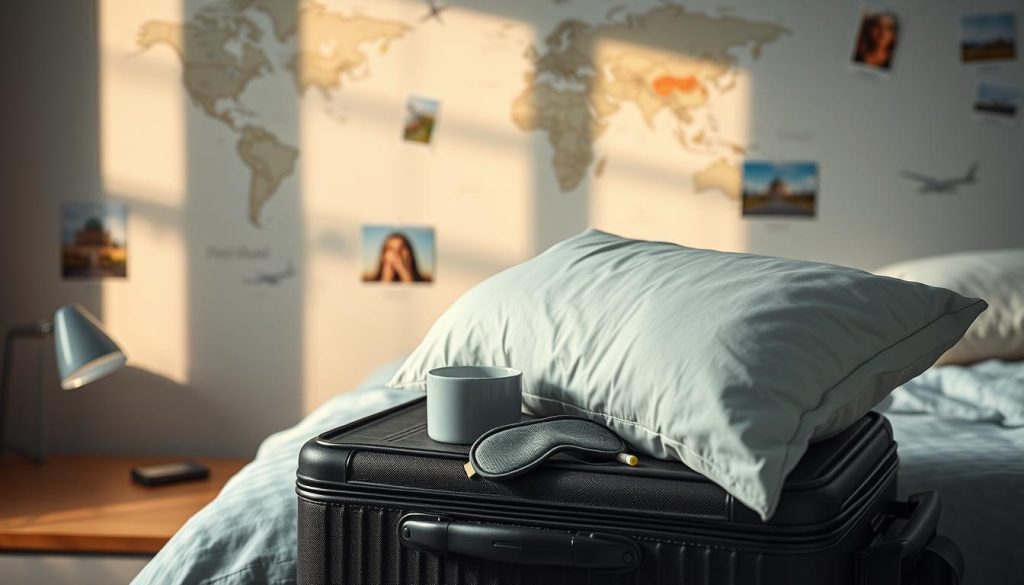Traveling to new places is exciting, but jet lag can ruin it. We know how to beat this common problem. In this guide, we’ll share tips to help you fight jet lag and enjoy your trip.
Adjusting your sleep before you go and managing symptoms in-flight are key. We’ll also cover how to recover after you arrive. Our tips will keep you energized and ready for your adventure, whether it’s across the country or around the world.
Understanding Jet Lag
Jet lag is a big problem for people who travel a lot. It happens when we cross time zones. This messes up our body’s clock, causing bad symptoms. Knowing what causes jet lag and its signs is key.
What Causes Jet Lag?
Jet lag comes from our body’s clock not matching the new time zone. Crossing time zones quickly messes up our sleep and body functions. This can make us tired, have trouble sleeping, and feel sick.
Symptoms of Jet Lag
- Extreme tiredness and lethargy
- Difficulty falling asleep or staying asleep
- Digestive issues like constipation, diarrhea, or nausea
- Inability to concentrate or focus
- Disorientation and confusion
- Headaches and muscle aches
Knowing why and how jet lag happens is the first step to fight it. By understanding its effect on our body’s clock, we can prepare better. This makes traveling smoother and more fun.

Combating Jet Lag Before Your Trip
One of the best ways to fight jet lag is to adjust your sleep schedule before you go. By changing your sleep times to match the new time zone, your body can adjust better. This makes jet lag less of a problem.
Adjusting Your Sleep Schedule
To change your sleep schedule, follow these steps:
- Start changing your bedtime and wake-up time 2-3 days before your trip. Move them 30-60 minutes each day towards the new time zone.
- Get bright light in the morning and dim light at night. This helps your body clock adjust to the new time.
- Don’t nap during the day. It can mess up your sleep schedule.
- Keep a regular sleep routine, even before your trip.
By doing these things, you can help your body adjust to the new time zone. This makes jet lag easier to handle when you arrive.

jet lag
Jet lag is a common problem for travelers crossing time zones. It messes with our body’s natural clock, causing tiredness and trouble sleeping during the day. Knowing what jet lag is and how it feels helps us find ways to beat it.
What Causes Jet Lag?
Jet lag happens when our body clock doesn’t match the local time. Traveling across time zones makes our sleep cycle hard to adjust. The number of zones, travel direction, and sleep habits also play a part.
Symptoms of Jet Lag
Jet lag symptoms vary, but common ones include:
- Difficulty falling asleep or staying asleep
- Daytime fatigue and sleepiness
- Gastrointestinal issues, such as constipation or diarrhea
- Difficulty concentrating or making decisions
- Mood changes, such as irritability or depression
Dealing with jet lag is key to a good travel experience. By knowing its causes and symptoms, we can find ways to manage it. This helps us enjoy our time at our destination.

Tips for Overcoming Jet Lag on the Plane
Managing jet lag starts on the plane. Adjust your schedule and use light and water to feel fresh. This way, you’ll be ready to go when you land.
Match your sleep and wake times with your destination’s. Stay awake during daylight if going west. Sleep at night if going east.
- Adjust your watch as soon as you board the plane to match the time zone of your destination.
- Avoid napping on the flight, as this can disrupt your body’s internal clock.
- Expose yourself to bright light during the “day” and limit light exposure during the “night” to help your body adapt.
- Stay hydrated by drinking plenty of water throughout the flight, as dehydration can exacerbate jet lag symptoms.
Plan your flight routine to ease jet lag. Follow these airplane tips for jet lag for a better trip. You’ll feel refreshed and ready to go.
Strategies for Recovering from Jet Lag
When you arrive at your destination, there are ways to beat jet lag. Adjusting your body clock and staying hydrated can help. This way, you can enjoy your trip without jet lag getting in the way.
Exposure to Natural Light
Getting outside in natural light is key to fighting jet lag. Our bodies use sunlight to keep our internal clock in sync. So, go outside during the day at your new place to help your body adjust.
Staying Hydrated
Drinking enough water is very important when you’re fighting jet lag. Travel can dry you out, making jet lag worse. Drink lots of water before, during, and after flying to stay healthy.
Using natural light and staying hydrated can help you recover from jet lag. These easy steps will make your travel smoother and more enjoyable.
Jet Lag and Melatonin
Melatonin is a natural hormone that helps fight jet lag. It controls our sleep-wake cycle. Taking melatonin supplements can help your body adjust to a new time zone.
When to Take Melatonin for Jet Lag
Timing is key when using melatonin for jet lag. Melatonin starts in our body when it gets dark. Taking a supplement signals to our body that it’s time to sleep.
- Before your flight: Start taking melatonin a few days before your trip. Adjust the timing to match your destination’s time zone. This helps your body start adjusting its clock.
- During your flight: Take a melatonin supplement a few hours before bedtime in the new zone. It helps you sleep better and adjust to the new schedule.
- After arrival: Keep taking melatonin at the right times to fully adjust to the new zone. The best dosage and timing vary, so try different amounts to find what works for you.
Using melatonin for jet lag can help you combat jet lag and enjoy your trip more. Always talk to your doctor before starting melatonin and jet lag supplements to make sure they’re safe for you.
| Timing of Melatonin for Jet Lag | Recommended Dosage |
|---|---|
| Before your flight | 0.5-5 mg, taken a few days prior to your trip |
| During your flight | 0.5-3 mg, taken a few hours before your desired bedtime in the new time zone |
| After arrival | 0.5-5 mg, taken at the appropriate times to help your body adapt |
Preventing Jet Lag on Return Flights
Coming home can be hard on our bodies, just like the trip away. To make the transition easy, we need to fight jet lag on our way back. A few simple steps can help us adjust to our sleep and energy levels, making our time at home better.
Start changing your sleep times a few days before you leave. Try to match your bedtime and wake-up to your home time zone. Also, watching how much natural light you get helps reset your body clock.
When you get back, drink lots of water and stick to a good sleep plan. Stay away from caffeine and alcohol to avoid making jet lag worse. Also, keep active to help your body get back to normal faster. By listening to your body and taking care of it, you can make your return trip easy. This way, you can quickly get back into your daily life feeling refreshed and ready to go.

